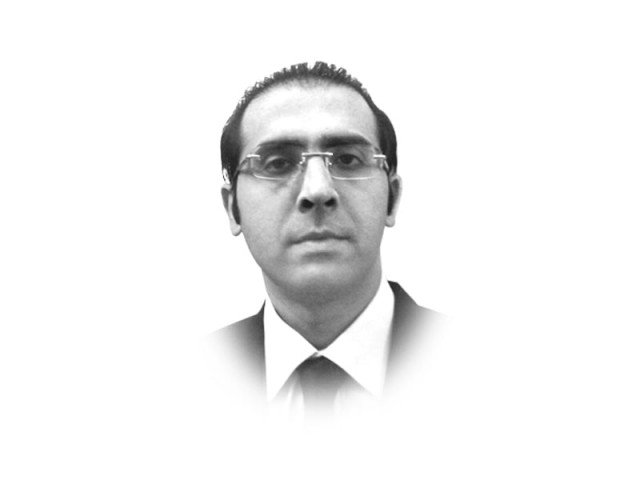Man on fire
Dr Mirza was successful in creating one of the most compelling spectacles of our already colourful political history.

Dr Mirza levelled allegations of extortion and sponsoring and patronising target killing on the MQM and on Interior Minister Rehman Malik. Perhaps the gravest charge was directed towards Altaf Hussain, i.e. of treason by being an instigator and an active party to a plan to break up Pakistan. The veracity of these allegations is open to question, however the significant point is that they have been levelled and done so very publicly.
The analysis on television immediately following his first firebrand press conference had one common thread, that his life is now in clear and imminent danger. There was also unanimity in the opinion that some violence will likely follow (which thankfully has not happened yet, at least not anything out of the ordinary). Since the venue and the subject of the press conference was Karachi, these concerns and observations were accepted as routine. Even if the press conference was deliberately provocative and politically incorrect, the threat of violence to Dr Mirza or random violence in the city does not logically follow, at least not outside of Karachi. As an example, some time back an MQM legislator went berserk at Nawaz Sharif and Chaudhary Nisar outside the National Assembly, punctuating his diatribe with hair transplants and humiliating and distasteful insinuations about very personal matters. It did stir up controversy, yet there was no concern for the safety of the said MNA. Similarly, people choose to express their opinions rather freely about President Asif Ali Zardari without arousing too much concern for their lives or the lives of an ethnic group. I admit that the parallels are not exact, since Karachi has a complex multi-ethnic composition and the accusations made are very serious. Yet, to me this does not obscure the primary principle that violence or the threat of it is not an appropriate response to speech (even to irresponsible and false speech).
Words have a peculiar and incurably violent life of their own in Karachi. Dr Mirza made an insensitive speech a couple of months ago regarding migrants from India and as a result dozens died in the next couple of days. The MQM said that the bloodshed was due to Dr Mirza’s statements. Here, again, the causal relationship is tenuous at best — while Dr Mirza should have been strongly censured for the speech, it does not explain the violence. The expression of displeasure in telephonic speeches often results in violence and mayhem soon after. William Butler Yeats was terrified to find out that some Irish rebels in 1916 went to their deaths at the hands of the British Army quoting lines from his play Cathleen ni Houlihan, and was prompted to write these words in his poem “Man and the Echo” — “Did that play of mine send out/Certain men the English shot?… Could my spoken words have checked/That whereby a house lay wrecked?”
The MQM chief is no Yeats, yet his words hold the same potency. Violence seems to have become an acceptable arbiter of social and political conflicts in Karachi.
Once Dr Mirza has said what he has chosen to say, it cannot be ignored in the guise of reconciliation or to avoid confrontation. A slap on the wrist to either of the parties is not sufficient. Either what he says is false, in which case he should be taken to court for slander and defamation, sending a clear unequivocal message to everyone that slurs of this nature will not go unaccounted for. Or, in the alternate, he has the means to prove his assertions. The allegation of patronising target killing cannot be answered by the interior minister claiming that Dr Mirza is like a younger brother. The response is diabolically irrelevant. The allegations have to be either proved or disproved in a court of law and one of the parties held culpable. An appropriate forum would be the suo motu hearings being conducted by the Supreme Court on the Karachi law and order situation. The trend so far of grand, ambitious, overarching suo motu actions is the absence of holding identifiable individuals culpable. An imprecise term like target killing further perpetuates this false sense of objectivism. Every individual who dies in a ‘target killing’ is the victim of murder and hence has at least one individual responsible for the act.
Reconciliation between senior political leadership taking place at Governor House and the Presidency has its place. However, the suggestion that because some distanced, removed bosses have made nice and that makes all the individual murders less barbaric or that they can be ignored is nauseating and has a revolting tinge of mafia operations to it.
Letting the present fiasco slide without holding someone guilty is setting an unbelievably dangerous precedent. The nature of the allegations distinguish this particular episode from the everyday political point-scoring that we have become accustomed to being witnesses to. Murder and treason are probably the two most severe charges that can be levelled on an individual or an organisation. The Supreme Court should ask Dr Mirza to produce his evidence in the ongoing proceedings and the MQM and Rehman Malik should be asked to put up their defences and one of the parties should be held accountable.
Published in The Express Tribune, September 5th, 2011.
















COMMENTS
Comments are moderated and generally will be posted if they are on-topic and not abusive.
For more information, please see our Comments FAQ